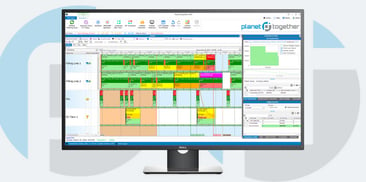Leveraging Advanced Analytics for Predictive Scheduling Insights
Production scheduling plays a pivotal role in optimizing operations and ensuring efficiency in chemical manufacturing. Production schedulers face numerous challenges, including fluctuating demand, raw material availability, equipment maintenance, and regulatory compliance. Traditional scheduling methods often fall short in addressing these complexities, leading to inefficiencies, production delays, and increased costs.
However, with the advent of advanced analytics and predictive scheduling insights, production schedulers now have powerful tools at their disposal to tackle these challenges head-on. By harnessing the integration between PlanetTogether—a leading production planning and scheduling software—and enterprise resource planning (ERP), supply chain management (SCM), and manufacturing execution systems (MES) such as SAP, Oracle, Microsoft, Kinaxis, and Aveva, production schedulers can unlock unprecedented levels of efficiency, agility, and competitiveness.
In this blog, we'll explore the significance of advanced analytics for predictive scheduling insights in chemical manufacturing, the benefits of integrating PlanetTogether with various ERP, SCM, and MES systems, and how production schedulers can leverage these capabilities to drive operational excellence.

The Need for Predictive Scheduling Insights in Chemical Manufacturing
Chemical manufacturing is a complex and highly regulated industry characterized by tight production schedules, stringent quality standards, and volatile market dynamics. Production schedulers are tasked with creating schedules that optimize resources, minimize lead times, and maximize throughput while adhering to safety and regulatory requirements.
Traditional scheduling methods, reliant on manual inputs and historical data, often struggle to adapt to the dynamic nature of chemical manufacturing. They lack the ability to anticipate disruptions, optimize schedules in real-time, and provide actionable insights for decision-making.
This is where predictive scheduling insights powered by advanced analytics come into play. By analyzing vast amounts of data—from historical production records to real-time market trends and external factors such as weather patterns and geopolitical events—production schedulers can gain a deeper understanding of the factors influencing their operations.
Predictive analytics algorithms can forecast demand patterns, identify potential bottlenecks, optimize production sequences, and suggest schedule adjustments proactively. This proactive approach enables production schedulers to anticipate issues before they arise, make informed decisions, and optimize resource allocation to meet customer demands efficiently.

Integration Between PlanetTogether and ERP, SCM, and MES Systems
To harness the full potential of predictive scheduling insights, production schedulers need access to integrated solutions that seamlessly connect production planning and scheduling with other critical business functions such as procurement, inventory management, and order fulfillment.
PlanetTogether stands out as a leading production planning and scheduling software renowned for its advanced analytics capabilities and intuitive interface. However, its true power lies in its integration with leading ERP, SCM, and MES systems, including SAP, Oracle, Microsoft Dynamics, Kinaxis RapidResponse, Aveva MES, and others.
By integrating PlanetTogether with these systems, production schedulers can achieve end-to-end visibility and control over their manufacturing operations. Data flows seamlessly between production planning, procurement, production execution, and order fulfillment processes, enabling real-time collaboration, information sharing, and decision-making across the organization.
Key Benefits of Integration
Real-time Data Integration: Integration between PlanetTogether and ERP, SCM, and MES systems ensures that production schedulers have access to real-time data from across the organization. This includes inventory levels, production capacities, order statuses, and supplier lead times, allowing for more accurate scheduling decisions.
Seamless Collaboration: Integrated systems facilitate seamless collaboration between different departments and stakeholders involved in the production process. Production schedulers can communicate with procurement teams to ensure timely availability of raw materials, coordinate with production supervisors to optimize machine utilization, and align with sales teams to prioritize customer orders.
Enhanced Predictive Analytics: By combining data from multiple sources, integrated systems enable more robust predictive analytics capabilities. Production schedulers can leverage advanced algorithms to forecast demand, identify potential supply chain disruptions, and simulate various production scenarios to optimize schedules proactively.
Improved Efficiency and Agility: Integration between PlanetTogether and ERP, SCM, and MES systems streamlines workflows, eliminates manual data entry errors, and reduces lead times. This results in improved operational efficiency, greater agility in responding to changing market conditions, and enhanced customer satisfaction.
Regulatory Compliance: Chemical manufacturers operate in a highly regulated environment, with strict compliance requirements governing safety, environmental impact, and product quality. Integrated systems ensure that production schedules adhere to regulatory guidelines and facilitate traceability and documentation for audits and reporting purposes.

Best Practices for Leveraging Predictive Scheduling Insights
To maximize the benefits of predictive scheduling insights, production schedulers should adopt the following best practices:
Invest in Data Quality and Integration: Ensure that data from various sources, including ERP, SCM, and MES systems, is accurate, consistent, and up-to-date. Invest in robust data integration tools and processes to facilitate seamless data exchange between systems.
Embrace Predictive Analytics: Leverage advanced analytics techniques such as machine learning and predictive modeling to forecast demand, identify patterns, and optimize production schedules proactively. Continuously refine predictive models based on feedback and real-time data to improve accuracy over time.
Foster Cross-functional Collaboration: Break down silos between different departments and encourage collaboration and information sharing across the organization. Involve stakeholders from procurement, production, sales, and finance in the scheduling process to ensure alignment with business objectives and priorities.
Monitor Performance Metrics: Establish key performance indicators (KPIs) to measure the effectiveness of production scheduling initiatives. Monitor metrics such as on-time delivery performance, inventory turnover, production efficiency, and customer satisfaction to identify areas for improvement and track progress over time.
Continuously Adapt and Improve: The manufacturing landscape is constantly evolving, with new technologies, market trends, and regulatory requirements emerging regularly. Stay agile and responsive by continuously monitoring industry developments, experimenting with new tools and techniques, and adapting your scheduling strategies accordingly.
Advanced analytics for predictive scheduling insights have the potential to revolutionize production scheduling in the chemical manufacturing industry. By integrating PlanetTogether with ERP, SCM, and MES systems, production schedulers can unlock unprecedented levels of efficiency, agility, and competitiveness.
By harnessing the power of real-time data, predictive analytics, and cross-functional collaboration, chemical manufacturers can optimize production schedules, reduce costs, improve customer satisfaction, and ensure compliance with regulatory requirements.
To stay ahead in today's competitive landscape, production schedulers must embrace the opportunities presented by advanced analytics and predictive scheduling insights and leverage them to drive operational excellence and business success.
Turn Predictive Scheduling Insights into an Integrated Chemical Manufacturing Stack
In this article, you’ve seen how advanced analytics and predictive scheduling insights can transform chemical manufacturing—helping schedulers anticipate disruptions, optimize sequences, and respond in real time to changes in demand, raw material availability, maintenance, and regulatory constraints. You’ve also seen how integrating PlanetTogether with ERP, SCM, and MES systems such as SAP, Oracle, Microsoft, Kinaxis, and Aveva creates the real-time data foundation needed for those insights.
To fully realize that value, your entire process manufacturing stack—ERP, planning/APS, recipe management, MES, and process control—needs to work together, not in silos.
That’s exactly what our white paper, “Process Industry Manufacturing Software: ERP, Planning, Recipe, MES & Process Control,” is designed to address. It lays out how these systems should fit together in process industries like chemicals, so you can support regulatory compliance, traceability, and quality while still improving efficiency and agility.
In this guide, you’ll learn how to:
- Clarify the roles of ERP, planning/APS, MES, recipe management, and process control in a chemical manufacturing environment
- Use integrated planning and scheduling to turn real-time data and predictive analytics into executable production plans and optimized sequences
- Ensure regulatory and safety requirements are modeled in your software stack so schedules remain compliant and auditable
- Connect PlanetTogether-style APS with ERP, SCM, and MES so predictive insights drive real decisions on capacity, inventory, and customer commitments
- Prioritize where to invest next to get the most benefit from analytics, integration, and automation in your chemical operations
If you’re serious about moving from advanced analytics on paper to a fully integrated, compliant, and agile chemical manufacturing stack, this white paper is your next step.
